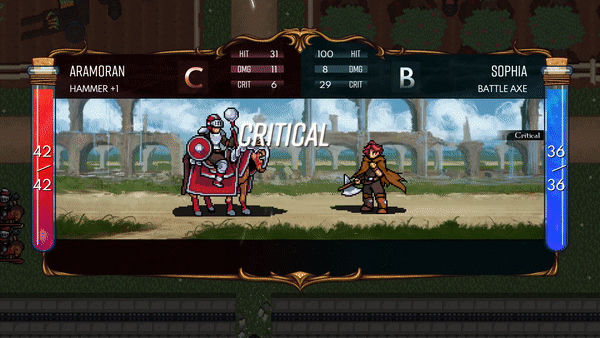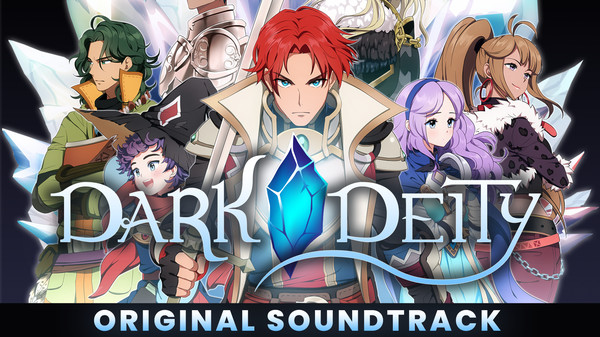| Time | Category | Rating | Notes |
|---|---|---|---|
| 3:46 | Difficulty | 10 / 10 | Is the game challenging enough? |
| 6:31 | Appearance | 10 / 10 | Does the game look dated, or is the appearance a return to form? |
| 8:49 | Sound | 9 / 10 | Soundtrack, sound effects, voice acting |
| 11:47 | Story | 8 / 10 | Is the story rich and engaging or boring? |
| 13:46 | Fun | 10 / 10 | Enjoyable or not? |
| 15:59 | Price | 10 / 10 | Overpriced or a good value? |
| 18:20 | Final Verdict | 9.5 / 10 | Game of the Year contender! |
I will preface this review by voicing my bias. My impression of the game might be different from yours for a few reasons, and I like to be honest in these scenarios. The first of which is that I am the target audience for this game. I have wanted Fire Emblem to have a serious competitor for a long time, and yearn for the Sacred Stones glory days. So, now that we have a PC tactical RPG that is exactly what I’ve been looking for, well, there comes my bias. The second is that MGN is a division of the same company that publishes the game, and as such I received a free copy of the game in exchange for a fair and honest review. With that said, let’s get into the review, what is Dark Deity?
Dark Deity is a strategic RPG, and if you’re looking for comparisons, like I mentioned the earlier days of Fire Emblem is a good one, or something like Wargroove also. It’s developed by Sword and Axe LLC, and is available on Steam right now. They key features that the game boasts are: a heavy focus on strategic gameplay, choices that matter, a huge cast of characters, lots of classes and class variety. How does that stack up against how the game actually plays and performs? Well, we’re going to see in MGN’s review of Dark Deity.
We’re going to judge Dark Deity on six points, we’ll give each point a score from ten, and those points will factor into the final verdict depending on their importance in the game and genre. We’re going to score Dark Deity on:
1: Difficulty – Is the game challenging enough to maintain the players interest in the gameplay, throughout an entire playthrough? Or, is it so easy that the gaming becomes boring quickly? Do choices indeed matter, and are their consequences that actually feel consequential? Are there different difficulties, and how are those handled? That’s all point one.
2: Appearance – The studio has chosen to present the game in the classic appearance style for the genre, in pixels. Does this feel dated, or is the appearance a return to form and where the genre should sit? How are the sprites, and the animations? That’s point two.
3: Sound – Sound is going to include a few points that contribute to the overall score. The first being the games soundtrack, the second being the sound effects themselves, and the third being voice acting. We’ll go over each of those to form the score for point three: sound.
4: Story – Simply put, RPG games need to have a good, and engaging story. They need to make the player want to be in the game’s universe, and give context to the players min-maxing and strategic gameplay. How does the story in Dark Deity stand up against those high expectations? We’ll see in point four.
5: Fun – Point five is fun and it is crucial, because if you’re not having fun when you sit down to play a game, what’s the point? Can you have fun and enjoy a 20 minute session with the game, can you have fun and enjoy a 2 hour session? We’ll see when we get to point five, fun.
6: Price – The final contributing factor in our overall score is price. Does the amount of time AND enjoyment that you get out of Dark Deity, stack up against how much money you have to fork out for it. Is it underpriced, overpriced, too long, too short, all of this falls under price.
3:46 Difficulty – 10/10
I’m going to start this point by saying that Dark Deity does difficulty like I wish all games did. They let you tailor the experience to exactly how difficult you want the game to be. How is this achieved? Well, you can customize how much experience you’re going to get, how much gold you’ll receive from defeating foes and levels, what classes the enemies are and even what items are scattered throughout. With this feature, you can play the game exactly how you want to, and you can REPLAY the game with different variables to challenge yourself. It’s exactly how difficulty should be handled it most cases, and it’s good to have all the options laid at your feet, to find the perfect mix for you.
I know what you’re thinking, there is a downside to this, in that you wont have a traditional experience that you can compare your playthrough to how the game was intended to be played. Don’t worry, Dark Deity has you covered there. If you don’t want to go through the finite details and craft your own difficulty, there are already three modes included in the game for an easy, medium, and hard experience depending on your preference, gameplay experience, and desire of challenge. So, don’t be concerned there if you don’t want to make the game more or less challenging by your own hand.
So, that’s how the game handles selecting a difficulty, but how is the challenge within the game? Well, the key note that experienced players will want to know about the game is that it does not include permadeath. You won’t be losing a character that you’ve worked on or formed a bond with. And I know that this will seem like a bad thing to veterans, but don’t mistake that for there being no consequences in the game. If you’re not planning well and using a strategy, you will be punished, just not with permadeath.

What are those consequences, and do they force enough mental acrobatics to make the game a challenge throughout?
Grave Wounds.
If one of your units is felled in battle, then they’ll be inflicted with a grave wound. The unit that died will have one random stat reduced by 10%. Having your fighter lose 10% strength? Ouch. So, you won’t lose the unit, but what the Grave Wounds system does do well is that is forces the player to be constantly thinking about their moves, and planning well. This is what you want from a tactical RPG, real consequences, without the game feeling cheap or too punishing, that it becomes more annoying than intriguing.
For the handling of difficulty customization, the preset levels, and the grave wounds system, I’m forced to give the difficulty in Dark Deity nothing less than a 10.
6:31 Appearance – 10/10
If you’ve been following the development of the game, you will know that getting the art just right has been quite the point of pride of the studio. The sprites and animations have been crafted with feedback, and the result is an obviously dedicated creation. The sprite work itself is fantastic, and no two that shouldn’t look alike, do. You can tell classes at a glance, and there is no visual clutter with pixels during the more graphic intensive sections of the game, like when characters collide during their fight animations.

I like the decision to make the game pixelated. All the best tactical RPG games have been in this art-style, and if you’re going to try and make a game that is the genres return to form after releases from other studios and developers have been disastrously disappointing for veterans, then you should do it the art style that those veterans are accustom too.
However, if you’re new to the genre, this doesn’t necessarily mean that you need a history in TRPG games to understand why the game is in pixels. It’s purposeful, and it looks good to the eye regardless. If I have had to make a comparison on the spirtework and dedication to the pixelated art-style decision, I’d have to go with something similar to Octopath Traveler – and that is high praise indeed.
As far as how demanding the game is graphically, we played it on a moderately powerful PC, and had no issues with stuttering, frame drops or anything of the like throughout the game, even in the more detailed or GPU intensive sections. What does this mean? Well, it opens up the game to a lot of players who want to play something like this on PC, but don’t own a NASA supercomputer. Chances are whatever you have will run Dark Deity just fine, without turning your PC or laptop into a super-heated volcano.
So, for choosing the most appropriate art styling, then having the desire and ability to execute something from the past and make it modern and crisp, again I can’t help but give Dark Deity a ten for it’s appearance.
8:49 Sound – 9/10
The first point we’re going to cover for the game’s sound is the soundtrack itself. You can purchase the soundtrack on Steam for $9.95AUD, and it features 51 tracks for about an hours worth of listening, composed by Sam Huss and Andy Han, and Adam Schmeider. I wanted to specifically name those composers in this review, for the level of enjoyment that I’ve gotten out of the Dark Deity soundtrack. It’s superb and I have not a single point of complaint about the composition.
It fits thematically with the game throughout, it’s blood-pumping where appropriate, and somber where it needs to be. It all feels very in sync with the story, and if you listen to the soundtrack standalone after finishing the game, you’ll be brought back to specific moments because the scores of the soundtrack make those story elements so impactful.
I suggest checking the soundtrack out, even if you’re not a fan of the game or the genre, because it makes for excellent studying music (or review writing music)!
The second point that we’re going to look at for sound is the game’s sound effects. The most concise way that I can explain the quality of sound effects in Dark Deity is that everything sounds exactly as you would expect it to. Arrows sound like they’ve been snapped from a bow string, weapons interacting with armor sound as they should, and there’s not really any example that I can give you that hits the ear wrong. The sound effects more magic aren’t terribly inspired, but they’re not ‘wrong’ per se.
Sure, sometimes sound effects wont stand out at you when you sit down to play a game, but Dark Deity’s are done well and there’s not any sound effect that is terribly jarring, or off enough to pull the player out of the experience. So, sound effects get a green tick overall.
The third point for Sound is going to be the voice acting, and I must say that the casting and execution of voice acting in Dark Deity is some of the highest in it’s class. It’s something that cannot be ignored, regardless of how much focus or attention you’re giving the game.
Whilst it can come not as often as maybe would have been liked, but what was there was of the highest quality. I say this because the voice acting mostly between played interactions, and the chiefest of voice lines will be during your combat scenario. This means that a lot of the games story and exposition, doesn’t capitalist on the voice talent, and sometimes it makes those moments drag on a little.
But, having said that, like I mentioned the casting and performances and are fantastic. Each character and their personality fits perfectly with the voice they’ve been assigned, and it’s easy to tell through the enthusiasm and vigor that voices lines are delivered with, that the cast is proud of their include in the game.
For these points overall combed, I’ve decided to assign sound in general a nine from ten.
11:47 Story – 8/10
The story behind Dark Deity isn’t anything groundbreakingly new. But that’s not necessarily a bad thing. The fantasy tropes that we know and love are tropes for a reason. There’s a calamity, there’s a king, there’s a war, and you have troops. The rest you can pretty much fill in the blanks yourself with.
I know what you’re thinking, ‘Luke, that kinda sounds like you haven’t enjoyed the story, why have you rated it so highly?’ Well, my answer would be that just because the story is familiar and used often in the genre, that doesn’t mean that it’s told poorly here, or that the studio Sword and Axe LLC haven’t added their own nuance to the tale.
The game does enough with the plot to provide interest to the gameplay, and gives you enough curiosity early to incite your interest in how the story will finish. There are also witticisms in the writing along the way, and all the characters are either really likable, or play their roll in antagonism well. You’d think with such a big cast of playable characters, that some would get lost in development, personality and story, or that a few would feel very similar. But to my surprise that wasn’t really the case.
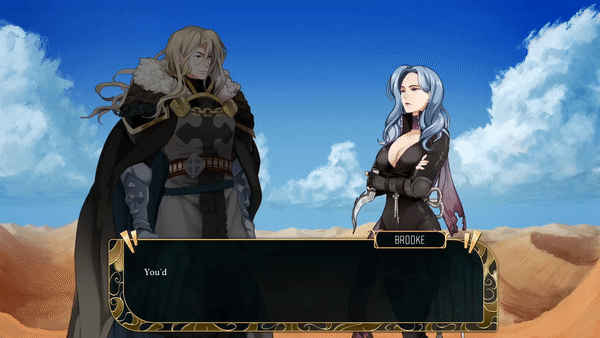
You’ll get to know the characters quickly, they’ll have their own development over the course of the game, and Dark Deity puts this on show really well with what the game calls the ‘Bonding’ mechanic. Interactions between the characters as their friendship develops throughout your playthrough. This is what stood out to me most from a story aspect. These bonding moments really flesh out the characters, tell interesting sub-stories, and make you genuinely care about the characters you’re controlling. With that care comes another element to the strategic gameplay, you gain more of a desire to not have your characters gain Grave Wounds, once you get to know them and their life.
It’s for those nuances to the fantasy tropes, and the crafting of fantastic characters, I’m going to give Dark Deity an eight for it’s story and the telling of that story.
13:46 Fun – 10/10
Sword and Axe know exactly what the tactical RPG player wants. Well, that’s what it seems like anything. Specifically, I’m talking about the class system within the game. You can evolve your units at level 10 and then again at level 30, with a huge variety in branching trees to choose from. You can make all-rounders with range, magic or melee, or you can specialize in a certain weapon wielder or damage type. You get the picture.
There are so many options when it comes to classes, that you’re going to look forward to leveling up to the evolve-levels so much, and crafting the characters that you know, into exactly what you want them to be. There’s dragons, there’s assassins, there’s everything. 54 classes in total, and choosing, and evolving your units is honestly exactly what I’ve wanted in the genre to this degree for the longest time. The freedom that the player is presented with, the levels of customization and min-maxing that you can achieve, and the satisfaction for crafting your units is done perfectly.
I know that’s not entirety the reason that people enjoy games in this genre, and perhaps not what everyone looks for, but I absolutely love it and the class system made the game extremely fun for me, especially in comparison to some disappointing competitors of late.
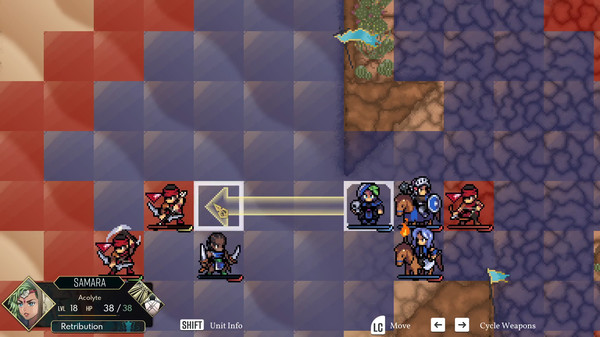
If that’s not your key focus in enjoying a TRPG, fear not, because the game earns it’s tactical tag also. As you would expect, before each encounter you’ll be able to fine tune your squad, buy weapons, upgrade items and so forth. Then you’ll get the turn based tactical gameplay itself. You’re given an objective, your guys against their guys, and you’re left with the coming up of the plan-of-attack yourself. It all plays as it should, and it’s going to be very familiar fans of the genre, without gatekeeping the game behind experience, and the fights themselves are just as fun as perfecting your units.
So, there are no hiccups for Dark Deity for the enjoyment that you’ll get from any aspect of gameplay. I struggle to think of a flaw in this respect, and that fact earns it a ten from ten for fun.
15:59 Price – 10/10
Sword & Axe and Freedom Games have launched the game at 20% off, but the full price thereafter is going to be $35.95AUD for the foreseeable future. So, we’re going to judge the price comparison on gameplay and enjoyment on the full price, as that’ll be around longer than the sale and is a true reflection of the commitment you need to make currency wise to play the game.
Would I say that the price is a reflection on how long that you’re going to be playing the game? It’s actually much longer, and for only $35.95, that’s pretty undemanding on the wallet.
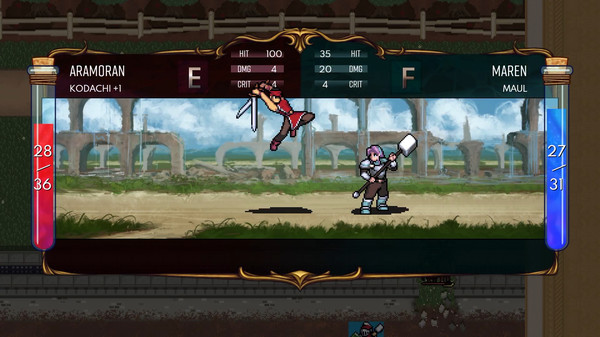
The amount of time that you’re going to get is pretty different depending on how you play RPG’s. If you like to rush through, just experience the story, and not min-max or delve into the subplots, you can finish the game in around 20 hours. However if you enjoy taking your time, really experiencing every facet of the game, and making your characters perfect, well then you can expect to get between 50-60 hours.
That’s on a single playthrough however, and because the difficulty and mechanics can be changed so much, and the result is a much different game each time, Dark Deity has so much replay value. You can invest and favor different units on a second playthrough, make different decisions, use different classes. You can take those 20 hour, or 50-60 hour playthroughs, and double or triple them with how many playthroughs that you can get out of the game, before you run out of new and interesting ways to play.
So, clearly the playtime isn’t an issue when it comes to price, you’re certainly getting your moneys worth there. But, that doesn’t make the price score alone, no. The game needs to be enjoyable throughout to get a good score. And like I mentioned, there are so many ways to play in subsequent replays after you finish the game. The game got a ten for fun, and is truly an absolute blast, so there’s no concern there when it comes to the game being worth the money.
You’re getting plenty of playtime, in a game that is going to be the goalpost for strategic RPGs for a very long time, all for $35.95AUD – that’s an easy ten.
18:20 Final Verdict: 9.5/10 – Game of the Year Contender
Much like Hades did last year, Dark Deity has the potential to sneak up on the big budget games launched in 2021, and steal the crown that is the game of the year.
That’s going to wrap things up for our comprehensive review on the Sword & Axe and Freedom Games game in Dark Deity. We at MGN hope your enjoyed our coverage thus far of the game, and if you agree or disagree with any of the points we’ve, we’d love to hear from you on the MGN.gg blog, the YouTube channel MGN TV, our new Twitter @MGN_TV, and the new Discord. Links for all these will be in the description of the video review. Keep an eye out for more Dark Deity content, because it’s coming!
Credits
| Program | Founding Writers |
| Author | Luke Cowling |
| YouTuber | Luke Cowling |
| Publisher | MGN |
| Game | Dark Deity |
